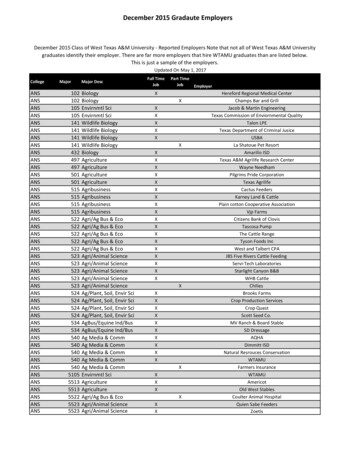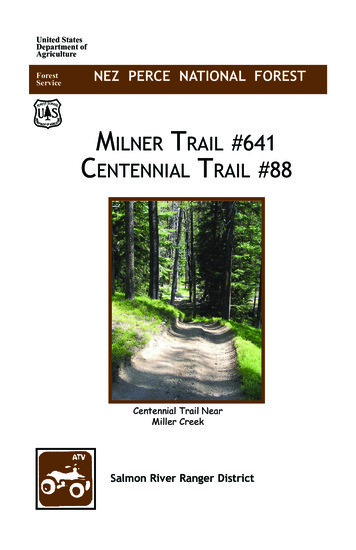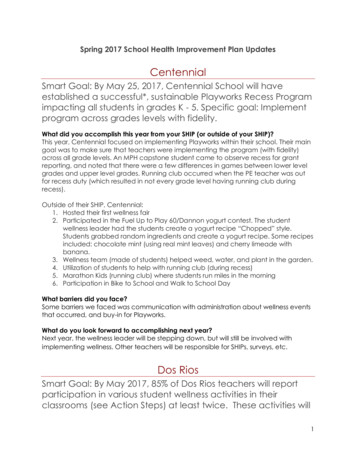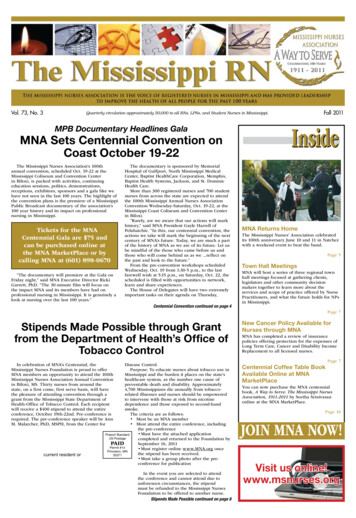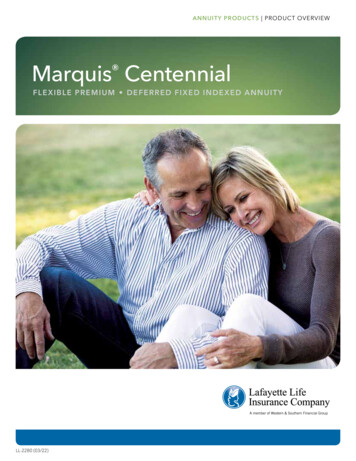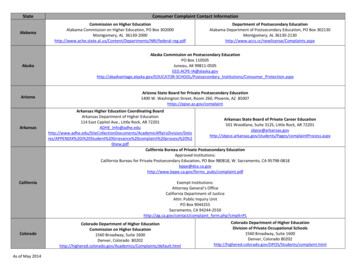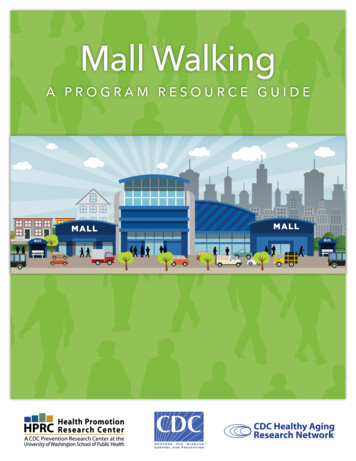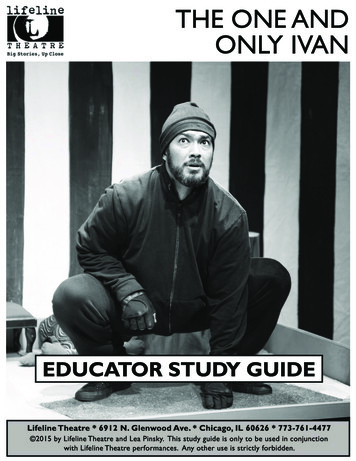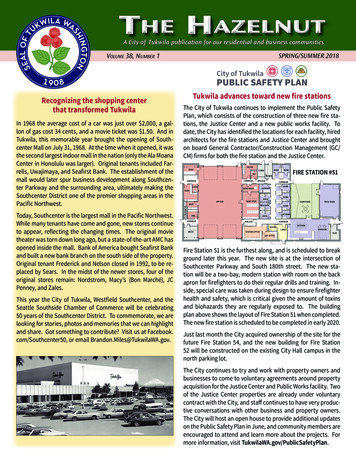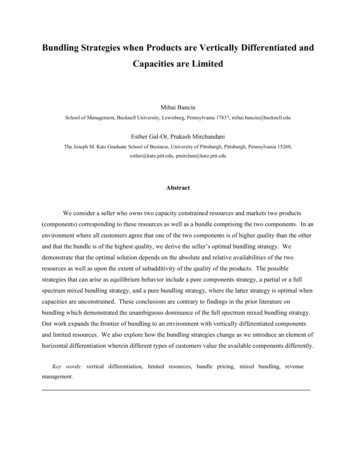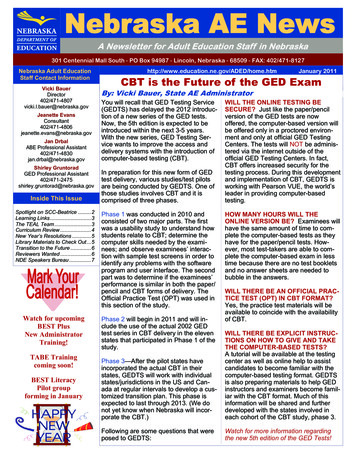
Transcription
A Newsletter for Adult Education Staff in Nebraska301 Centennial Mall South - PO Box 94987 - Lincoln, Nebraska - 68509 - FAX: 402/471-8127Nebraska Adult EducationStaff Contact InformationVicki vJeanette .govJan DrbalABE Professional Assistant402/471-4830jan.drbal@nebraska.govShirley GruntoradGED Professional vInside This IssueSpotlight on SCC-Beatrice . 2Learning Links . 3The TEAL Team . 3Curriculum Review . 4New Year’s Resolutions . 5Library Materials to Check Out . 5Transition to the Future . 6Reviewers Wanted . 6NDE Speakers Bureau . 7Watch for upcomingBEST PlusNew AdministratorTraining!TABE Trainingcoming soon!BEST LiteracyPilot groupforming in nuary 2011CBT is the Future of the GED ExamBy: Vicki Bauer, State AE AdministratorYou will recall that GED Testing Service(GEDTS) has delayed the 2012 introduction of a new series of the GED tests.Now, the 5th edition is expected to beintroduced within the next 3-5 years.With the new series, GED Testing Service wants to improve the access anddelivery systems with the introduction ofcomputer-based testing (CBT).In preparation for this new form of GEDtest delivery, various studies/test pilotsare being conducted by GEDTS. One ofthose studies involves CBT and it iscomprised of three phases.Phase 1 was conducted in 2010 andconsisted of two major parts. The firstwas a usability study to understand howstudents relate to CBT; determine thecomputer skills needed by the examinees; and observe examinees’ interaction with sample test screens in order toidentify any problems with the softwareprogram and user interface. The secondpart was to determine if the examinees’performance is similar in both the paper/pencil and CBT forms of delivery. TheOfficial Practice Test (OPT) was used inthis section of the study.Phase 2 will begin in 2011 and will include the use of the actual 2002 GEDtest series in CBT delivery in the elevenstates that participated in Phase 1 of thestudy.WILL THE ONLINE TESTING BESECURE? Just like the paper/pencilversion of the GED tests are nowoffered, the computer-based version willbe offered only in a proctored environment and only at official GED TestingCenters. The tests will NOT be administered via the internet outside of theofficial GED Testing Centers. In fact,CBT offers increased security for thetesting process. During this developmentand implementation of CBT, GEDTS isworking with Pearson VUE, the world’sleader in providing computer-basedtesting.HOW MANY HOURS WILL THEONLINE VERSION BE? Examinees willhave the same amount of time to complete the computer-based tests as theyhave for the paper/pencil tests. However, most test-takers are able to complete the computer-based exam in lesstime because there are no test bookletsand no answer sheets are needed tobubble in the answers.WILL THERE BE AN OFFICIAL PRACTICE TEST (OPT) IN CBT FORMAT?Yes, the practice test materials will beavailable to coincide with the availabilityof CBT.Phase 3—After the pilot states haveincorporated the actual CBT in theirstates, GEDTS will work with individualstates/jurisdictions in the US and Canada at regular intervals to develop a customized transition plan. This phase isexpected to last through 2013. (We donot yet know when Nebraska will incorporate the CBT.)WILL THERE BE EXPLICIT INSTRUCTIONS ON HOW TO GIVE AND TAKETHE COMPUTER-BASED TESTS?A tutorial will be available at the testingcenter as well as online help to assistcandidates to become familiar with thecomputer-based testing format. GEDTSis also preparing materials to help GEDinstructors and examiners become familiar with the CBT format. Much of thisinformation will be shared and furtherdeveloped with the states involved ineach cohort of the CBT study, phase 3.Following are some questions that wereposed to GEDTS:Watch for more information regardingthe new 5th edition of the GED Tests!
Page 2AE News — January 2011Southeast Community College—BeatriceBy: Lorraine Jensby, Assistant Program Director—SCC-BeatriceWe have a volunteer coordinator andshe helps our program continue toserve student needs in the smallercommunities by placing students withvolunteer tutors when the studentscannot travel to one of the class sites.The Southeast Community CollegeBeatrice Adult Education programoffers classes and tutoring in the 14southeast Nebraska counties surrounding Lancaster County. The cityof Lincoln and Lancaster county areserved by the SCC-Lincoln AdultEducation program.For the current program year we began offering some managed enrollment sessions, so our classes are nolonger available for drop-in enrollmentwhenever it is convenient for the student. This change, along with charging a 20 registration fee, has addedsome value to our program and wehave seen a positive response.We also changed our information provided during orientation sessions thisThere have been quite a few changes year to focus more on student commade to our program the past several mitment and accountability and lessactual GED testing information. Weyears as we continue to serve stuwant the students to focus on thedents in the best way possible withcommitment they will need to make tothe funding we receive.attain the GED credential or to improve their basic skills and not focusIn the past we offered regularlyscheduled classes with a paid instruc- as much on the specific testing infortor in a number of smaller communi- mation which is the end result, but notthe path they need to take to getties throughout our program area.there!Many of those classes were servingfewer than 10 students per year sowe have dropped them as class sites Our largest class site is Beatrice andand have concentrated our funding in we offer morning, afternoon and evening sessions. The day classes are inoffering classes in the larger, morea classroom on the SCC-Beatricepopulated communities and areas.campus and the evening class meetsWe currently offer AE/GED classes in downtown at the Beatrice PublicAuburn, Beatrice, Fairbury, Falls City, Library.Nebraska City and Seward. EnglishWe have computer access in ouras a Second Language classes areoffered in Beatrice, Fairbury and Ne- classroom on campus and we aretrying a new current events curricubraska City and a citizenship classwill be offered this winter in Nebraska lum this year at this class site.City.Tiffany Morris, an SCC-Beatrice GEDstudent, uses the on-line version ofNewsCurrents, a weekly currentevents program focused on nationaland international news, as part of hertest preparation curriculum.NewsCurrents, published by Knowledge Unlimited, is a weekly currentevents discussion program focusedon national and international news. Itis designed to be used in grades 3through 12 and each issue is writtenon three distinct vocabulary and concept levels.All three levels are contained in oneteacher’s guide for maximum flexibility within a class. The subscription isfor 34 weeks (September-May) and isavailable on DVD or online with images corresponding to five or six stories in that week’s news.There are some positive and negativeaspects to most all curriculum materials, but for the most part our instructor and students at the Beatrice classsite are enjoying using this material.
Page 3AE News — January 2011It has been requested that we include a feature in the newslettereach month that identifies usefulwebsites, applications, and technology information for adult educationclassroom/student use.Here at NDE we occasionally see orhear about something we think youmight like to use. We will share thisinformation as we can, BUT we needyour help. If you find, see, use or likesomething in particular, PLEASEshare with Jeanette for use in thenewsletter.Send us the information for accessing, any costs involved and how youhave used it with your students forinclusion in the newsletter.For this month, Shannon Schaben(Mid-Plains), has provided information for an ESL website that she useswith her classes. She is especiallyimpressed with the Listening Activities for her ESL students. You canbookmark it for easy access anytimeyou want it: http://fog.ccsf.cc.ca.us/ lfried/LearnerWeb.orgThis site allows access to resourcesfor working with students. One of theactivities it highlights is goal settingand determining potential steps or apathway to achieving the goal,(achieving the GED).highlightingcareers built around manufacturing.Manufacturing companies are desperate to recruit new, young talent.Students often do not realize the new“meaning” of working in the manufacturing field. It seems to be a verypositive and well structured careerwebsite.Izzit.org This website has been recommended by Susan Harder, NECorrections Education. The site hasresources and also a plan for educators to access a free video.Some clips are very interesting.There is no cost to using the site,but there is expense if you opt toDreamit-doit.comThis site is part of a national initiative purchase videos.The TEAL TeamBy: Shannon Schaben, Adult Education/ESL Instructor—Mid-Plains Community CollegeThe Teaching and Excellence in Adult Literacy (TEAL) team for Nebraska is accomplishingand learning many new and exciting things in the online classroom while connecting withother Adult Education instructors from all over the United States. The module we just completed was on goal setting. I found that I am not alone in my current goal setting strategieswith students. I am hoping to improve my strategies to kick off 2011.When we think about goals, it’s helpful to think about the ABCDs of goal-setting or objective writing (described byHeinlich, Molenda, Russell, & Smaldino [1996] in Instructional Media and Technologies for Learning. EnglewoodCliffs, NJ: Merrill).Audience: The students that the objective is written forBehavior: The verb that describes what the audience will be able to doCondition: The circumstances under which the audience will perform the behaviorDegree: Acceptable performanceExample of objectives for our students: When one of their children is ill (condition), ESL students (audience)will be able to phone the school office to report their child’s absence (behavior) with 90% accuracy (degree).Be sure to watch the monthly newsletters for more TEAL updates! Happy 2011
Page 4AE News — January 2011Tutor: A Collaborative, Learner-Centered Approach toLiteracy Instruction for Teens and Adults (8th Edition)Curriculum ReviewReviewed By: Amy Tunning, Adult Education Instructor-Omaha Public SchoolsAre you working with a low-levelreader and feeling you are notequipped with the skills and/or thematerials necessary to help this student improve their literacy? Tutor: ACollaborative, Learner-Centered Approach to Literacy Instruction forTeens and Adults by Ruth JohnsonColvin may be the book you havebeen looking for!step instruction is given, with lots ofscenarios using actual students withthe sample lessons.This 8th edition is for anyone whowishes to help improve literacy skills,whether it is a professional teacher ora volunteer without teaching experience. In this book you will find theory,demonstrations, and opportunities topractice the various skills of literacy.Again, this resource would be valuable for any adult education teacherin both GED and ELL classes.The appendix provides a wealth ofresources, including word lists (sightwords, word patterns, transportationsigns, etc.) as well as lesson plansheets and a checklist for evaluatingadult education reading material.The eleven chapters in Tutor areseparated to teach the various aspects of reading and writing. There isa chapter dedicated to goal settingwith your student(s), and one inThere are five underlying themes:developing skills with reading maps, Respect for students as individuals calendars, and computers. Another Sharing of the teaching and learning chapter is dedicated to assessmenttechniques the tutor can use and how Sensitivity to the adult need forto plan lessons.immediate relevance Tutoring and learning as collaboraA “Learner Profile” worksheet is intive activitiescluded, and is followed up with page Integration of all language componumbers of the targeted instructionnents (listening, speaking, readingskills to assist with remediation. Thatand writing)makes it very user friendly and helpsThese themes make Tutor a valuable to individualize for each student’s perbook for any adult educator to review, sonal needs.as these themes are standard in alladult education classes. Although the Tutor would be a great addition to anyadult education program. Volunteerstips and lessons are literacy based,working with low level readers/writersthey are sound educational pedawould benefit tremendously by havinggogy, and worthwhile to consider.this book available to them. It is basicenough that a volunteer could beTutor uses a holistic approach indeepening the reader’s understanding come an effective literacy tutor by folof literacy and tutoring. From the Lan- lowing the book.guage Experience Approach for nonThe skills, theory, and resources thereaders, to teaching sight words,word patterns, and in comprehension book provides make it a book thatand critical thinking skills, there are a should be on the shelf of literacyvariety of tips and lessons to help any books available. It could also providea resource to use for staff developstudent of literacy.ment in literacy training or a book clubThe lessons can be used to teach in- discussion on any of the variouschapter topics.dividuals or small groups. Step byCheck out this book and refresh youreducational background, and feel alittle more confident the next time youmake the difference in the literacyskills of your students.About the author:Ruth Johnson ColvinColvin is the founder of Literacy Volunteers of America, now ProLiteracyWorldwide. An avid reader, she became aware the problem of illiteracyin her home city of Syracuse, NewYork when the 1960 census reportwas released. Working with readingspecialists at Syracuse University,she developed materials to teach volunteer tutors motivation and instruction techniques.The tutors she recruited and trainedfrom her church women's groupformed the first literacy volunteer program in Syracuse. Her initiative, Literacy Volunteers of America, was incorporated in 1967, and is now a national, educational, non-profit organization with national/state/local staffand volunteer board of directors.The organization now has nearly 330programs in 42 states and works inconjunction with correctional facilities,adult educational programs, schools,universities, libraries, industry, andother community service px?audience students&item Students/WhoWeAre/Famous/Colvin.xml
Page 5AE News — January 20112011 New Year’s ResolutionsFrom: http://kcnewyears.com/newyearsresolutions/The start of a New Year has always been a time for looking back to the past, and more importantly, forward to thecoming year. It's a time to reflect on the changes we want (or need) to make and resolve to follow through on thosechanges. Did your New Year resolutions make the top ten list?#1 Spend More Time with Family & FriendsRecent polls conducted by General Nutrition Centers,Quicken, and others show that more than 50% of Americans vow to appreciate loved ones and spend more timewith family and friends this year.#2 Fit in FitnessThe evidence is in for fitness. Regular exercise has beenassociated with more health benefits than anything elseknown to man. Studies show that it reduces the risk ofsome cancers, increases longevity, helps achieve andmaintain weight loss, enhances mood, lowers bloodpressure, and even improves arthritis. In short, exercisekeeps you healthy and makes you look and feel better.#3 Tame the BulgeFifty-five percent of adults in America are overweight, soit is not surprising to find that weight loss is one of themost popular New Year's resolutions. Setting reasonablegoals and staying focused are the two most importantfactors in sticking with a weight loss program, and thekey to success for those millions of Americans whomade a New Year's commitment to shed extra pounds.#4 Quit SmokingIf you have resolved to make this the year that youstamp out your smoking habit, over-the-counter availability of nicotine replacement therapy now provides easieraccess to proven quit-smoking aids. Even if you've triedto quit before and failed, don't let it get you down. Onaverage, smokers try about four times before they quitfor good. Start enjoying the rest of your smoke-free life!#5 Enjoy Life MoreGiven the hectic, stressful lifestyles of millions of Americans, it is no wonder that "enjoying life more" has become a popular resolution in recent years.#6 Quit DrinkingWhile many people use the New Year as an incentive tofinally stop drinking, most are not equipped to makesuch a drastic lifestyle change all at once. Many heavydrinkers fail to quit cold turkey but do much better whenthey taper gradually, or learn to moderate their drinking.#7 Get Out of DebtWas money a big source of stress in your life last year?Join the millions of Americans who have resolved tospend this year getting a handle on their finances. It's apromise that will repay itself many times over in the yearahead.#8 Learn Something NewHave you vowed to make this year the year to learnsomething new? Perhaps you are considering a careerchange, want to learn a new language, or just how to fixyour computer? Whether you take a course or read abook, you'll find education to be one of the easiest, mostmotivating New Year's resolutions to keep. Challengeyour mind in the coming year, and your horizons will expand.#9 Help OthersA popular, non-selfish New Year's resolution, volunteerism can take many forms. Whether you choose to spendtime helping out at your local library, mentoring a child,or building a house, nonprofit volunteer organizationscould really use your help.#10 Get OrganizedOn just about every New Year resolution top ten list, organization can be a very reasonable goal. You want yourhome organized enough that you can invite someoneover on a whim, and your office organized enough thatyou can find the stapler when you need it.NDE Library Materials Available for AE Staff to Check OutThe State AE Office of NDE has a lending library of materials for both AE and ESL. Some are forinstructors and others are resources containing practical ideas and exercises to be used with students. rceLibrary.pdf. Many of theresources contain EXCELLENT material for students struggling in specific areas. Other materialswould make WONDERFUL additions to, or a basis for staff development sessions. If you would like to preview ordiscuss any of the materials, just drop in or contact Jeanette. Materials can be checked out for 6 weeks (longer if notin demand). If you should decide you would like to peruse some, please call or e-mail Jeanette: 402/471-4806 orjeanette.evans@nebraska.gov
Page 6AE News — January 2011Transition to the FutureBy: Jeanette Evans, Nebraska Adult Education ConsultantABE conversations are often centered around transition—transition towork, transition to career, transitionto some type of post secondary training. There are many things to consider and use with students in preparing them to live and work in the21st Century.For many of us, this whole processdemands some mindset, philosophical and paradigm shifts. It is important to guide students in thinking“beyond” GED completion or acquiring basic survival English! Workplaceskills can be imbedded and rolemodeled in every classroom activityor lesson!Technology available and the savvyof students need to be explored andapplied in the classroom. Teachersdon’t have to have all the answers—stretch student thinking by challenging them to find an answer and defend it. The day of passing out workbooks and pencils or teaching fractions purely for the sake of teachingfractions is gone. We have to extendlessons as far as we can and challenge students to reach for thefuture.Knowing how to learn for a lifetime isa basic characteristic of an information literate person—which is whatadult education classes are/shouldbe striving to do. There are createdstandards for what that might looklike that will be shared here. Thesecome to us from the American Association of School Librarians.builder. It will definitely provide achallenge and the end product willaid resume writing and the job application process.Standard Two: Learners use skills,resources, and tools to draw conclusions, make informed decisions, apply knowledge to new situations andcreate new knowledge.Common BeliefsStandard One: Learners use skills,resources, and tools to inquire, thinkcritically and gain knowledge.What about asking students to writeabout their skills with prompts suchas: What are your strongest skills?What skills would you like to have?How could you personally expandyour skills? This incorporates criticalthinking, analysis and is a relevant,work-related way to build writingskills that will serve the student in theworkplace and in post-secondarysettings.The reflection necessary to developthe writing assignment allows thestudent to do some soul-searchingand may even serve as a confidenceA class discussion centered arounda workplace situation or preparationfor post-secondary training allowsthe students to build vocabulary,develop speaking fluency and confidence, learn from each other, “risk”sharing opinions, ideas and thoughtsthat will be necessary and useful inparticipating in workplace teammeetings.In doing so, professionalism, diplomacy and appropriateness become“bonus” learning for the future. Adultstudents have a wealth of priorknowledge to use and share, and itbecomes a perfect opportunity toincorporate what they already knowwith new information/knowledge.Continued on page 7Resource Materials Needing To Be ReviewedNDE tries to add to the collection of resources available on a regular basis.A 25 stipend is paid to individuals who provide a review forpublication in this AE newsletter.This month, the following books are available for review:Dr. Stephen Brookfield, a professor in the Department of Higher Learning at Columbia University, has writtenseveral books around the themes of critical thinking and reflection on learning. Understanding andFacilitating Adult Learning looks like great background material for the adult education instructor.Krista Kjeldgaard, also a presenter at the annual conference, recommended two books from Teachers of Englishto Speakers of Other Languages (TESOL). Adult Language Learners: Context and Innovation and Authenticity inthe Language Classroom and Beyond: Adult Learners. Both are available for review and/or check out to Adult Edstaff members.REMINDER: If you are looking for professional development materials or topics, the state resource library is theplace to start! Materials available are listed on the NDE website and/or you may contact Jeanette for more information at 402-471-4806 or email: jeanette.evans@nebraska.gov
Page 7AE News — January 2011Transition to the Future, ContinuedContinued from page 6resources, and tools to pursue personal and esthetic growth. Socialskills, appropriate workplace appearStandard Three: Learners use skills, ance, grooming, leisure activities,resources, and tools to share knowl- health and wellness—the sky’s thelimit.edge, and participate ethically andproductively as members for ourHave a “healthy snack” day. Comdemocratic society.pare cost of packing a lunch for workas opposed to eating out. Have aCurrent events—do you get your“dress for work” day in the classnews from your i-phone, internet,room. Share hobbies and interests.newspaper, radio? How do youdecide if it is from a reliable source? All of this is an opportunity to assistHow does the news impact your life, students to build balance in theirlives and possibly explore ideasyour decisions, your interests,never before considered.spending, leisure activities?Student smiles and nodding headscome with this type of learning!Choose a topic or topics—go for it—what do the students know? What dothey think? What could they researchwith the resources available in theclassroom, their hand-held devices,the computer lab, the library? What agreat way to learn how to expressopinions, deal with opinions contraryto personal beliefs, gain new insights, debate. All of the above givestudents a leg up in the work worldand /or the post secondary classroom. It also provides another opportunity to use technology.Note that none of the classroomideas involve great amounts of planning and preparation. Many are student-driven, all incorporate skills forthe future and provide opportunitiesfor reading, writing, math, communication, or technology use.Standard Four: Learners use skills,Nebraska Department of Labor hasEach of the programs have Workplace Essential Skills curriculumthat would be very useful and it’s allplanned out for the classroom. If youhaven’t tried out the various components, maybe 2011 is the time!EXCELLENT tools and informationfor you and your students. Check outthe following websites and/or sharethem with your ents can job search, completea self-assessment profile to guidethem to career fields of interest, complete a Work Importance Profiler tocreate an awareness of what factorswould/could/should be important tothem as they seek out a job or acareer.The websites are new and improved.Time spent there is interesting andinformative.Teachers and students have countless new ways to look at the adulteducation classroom and the learning that takes place there. Explore,challenge, create and enjoy!!!!NDE Speakers BureauNDE Adult Education has been asked, and Jeanette has promised, to develop sometype of topic and speaker list to assist programs in developing local professional trainingsessions. These sessions could be program-specific, general, or something you thinkmight make a good topic or presentation for the annual conference.If you have ideas for topics, suggested speakers or any pertinent info to share, OR youwould like to present on a topic in your area of expertise, please let Jeanette knowjeanette.evans@nebraska.gov. It is always to our advantage to pool our talents andknowledge to share with each other and the AE programs of the state. We want to beable to assist in any way we can.If you suggest a speaker, please provide the contact info so I can get in touch personally. As the list is developed, I will be sharing with the local program directors so everyone in the state may have an opportunity to benefit from our state’s talent pool!Thanks for your help in making pertinent and necessary training available in the state.Please respond with your suggestions, questions, concerns, and decisions byJanuary 14, 2011 if at all possible. We’ll be waiting for your ideas and suggestions!
offering classes in the larger, more populated communities and areas. We currently offer AE/GED classes in Auburn, Beatrice, Fairbury, Falls City, Nebraska City and Seward. English as a Second Language classes are offered in Beatrice, Fairbury and Ne-braska City and a citizenship class will be offered this winter in Nebraska City.
